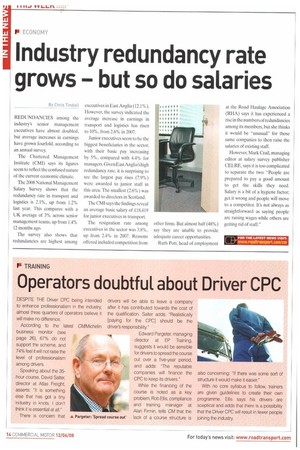P ECONOMY
Page 14

If you've noticed an error in this article please click here to report it so we can fix it.
Industry redundancy rate
7 grows but so do salaries By Chris Tindall REDUNDANCIES among the industry's senior management executives have almost doubled, but average increases in earnings have grown fourfold, according to an annual survey.
The Chartered Management Institute (CMI) says its figures seem to reflect the confused nature of the current economic climate.
The 2008 National Management Salary Survey shows that the redundancy rate in transport and logistics is 2.1%, up from 1.2% last year This compares with a UK average of 3% across senior management teams, up from 1.4% 12 months ago.
The survey also shows that redundancies are highest among executives in East Anglia (12.1%). However, the survey indicated the average increase in earnings in transport and logistics has risen to 10%, from 2.6% in 2007.
Junior executives seem to be the biggest beneficiaries in the sector, with their basic pay increasing by 5%, compared with 4.4% for managers. Given East Anglia's high redundancy rate, it is surprising to see the largest pay rises (7.9%) were awarded to junior staff in this area. The smallest (2.6%) was awarded to directors in Scotland.
The CM1 says the findings reveal an average basic salary of £18,419 for junior executives in transport.
The resignation rate among executives in the sector was 3.8%, up from 2.4% in 2007. Reasons offered included competition from other firms. But almost half (48%) say they are unable to provide adequate career opportunities. Ruth Pott. head of employment at the Road Haulage Association (RI-IA) says it has experienced a rise in the numbers of redundancies among its members, but she thinks it would be "unusual" for those same companies to then raise the salaries of existing staff.
However, Mark Crail, managing editor at salary survey publisher CELRE, says it is too complicated to separate the two: "People are prepared to pay a good amount to get the skills they need. Salary is a bit of a hygiene factor; get it wrong and people will move to a competitor. It's not always as straightforward as saying people are raising wages while others are getting rid of staff."
















































































































































































